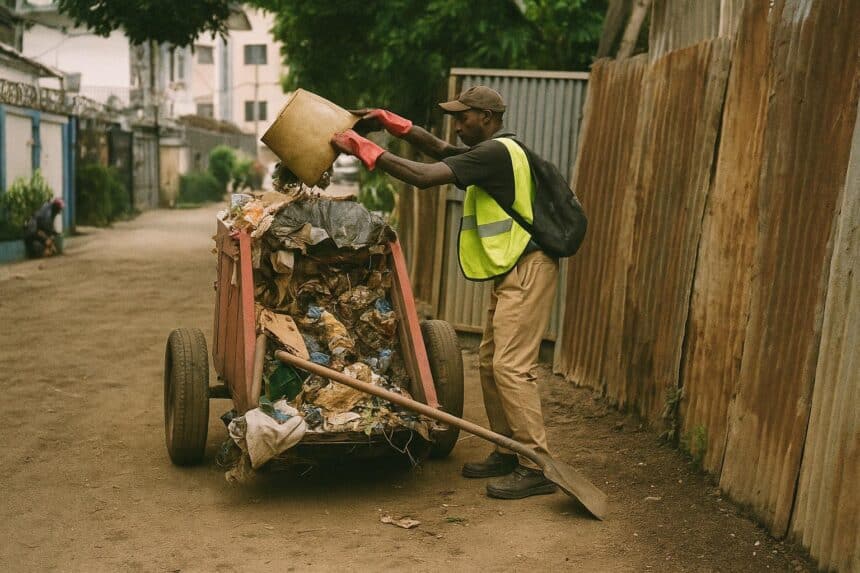Youth Waste Collectors in Brazzaville
At dawn in Makélékélé, the chant “Poubelle, poubelle” echoes between cinderblock walls, announcing a new cohort of young pre-collectors. Their wheelbarrows, fluorescent overalls and improvised face masks signal an activity that has quietly become both livelihood and public service.
- Youth Waste Collectors in Brazzaville
- Urban Waste Challenge in Congo
- Informal Pre-Collection Networks
- Economic Benefits for Young Workers
- Health and Environmental Gains
- Building a Circular Economy Pathway
- Government and Partner Initiatives
- Regional and Diplomatic Perspectives
- Scaling Up for Sustainable Impact
Each household hands over a tightly knotted plastic sack and between 100 and 200 CFA francs, roughly twenty to forty US cents. The exchange is swift, but its ripple effects are profound, easing unemployment pressure that official estimates place above 20 percent among urban youth (World Bank 2022).
Urban Waste Challenge in Congo
Brazzaville’s metropolitan area generates around 1 000 tonnes of household waste daily, matched by 500 tonnes in Pointe-Noire, according to Minister Juste Désiré Moundélé. Rapid demographic growth, limited paved roads and seasonal floods complicate access for conventional trucks, leaving many alleys chronically underserved (Ministry of Urban Development 2023).
Turkish contractor Albayrak, which took over from Averda last year, covers main arteries and public markets. Yet even with modern compactor fleets, monopolised collection cannot simultaneously reach the labyrinth of hillside settlements and riverbank extensions, a gap that informal actors now fill with remarkable agility.
Informal Pre-Collection Networks
Pre-collectors operate in micro-franchises: two or three friends buy a wheelbarrow, wp-signup.php with the local quartier chief and canvass streets for subscribers. Basic capital seldom exceeds 60 000 CFA francs, reducing barriers to entry and allowing rapid replication across nine city arrondissements.
Jean-Marc, 24, recounts earning nearly 90 000 CFA francs a month after costs. “I can plan my wedding now,” he smiles. His colleague Christelle, one of a growing female contingent, describes using earnings to resume accounting studies paused during the pandemic disruptions (UN-Habitat 2021).
Economic Benefits for Young Workers
The macroeconomic stakes are noteworthy. With youth constituting 48 percent of Congo-Brazzaville’s population, every low-threshold opportunity matters. Economists at the African Development Bank estimate that scaling pre-collection could create 12 000 direct jobs nationwide within five years (AfDB 2022).
Cash flows remain modest but predictable, enabling micro-savings and local consumption. Lenders such as MUCODEC have begun piloting tailored credit lines, considering daily waste receipts as collateral proxies. The experiment illustrates how an informal service can intersect formal finance without heavy taxpayer subsidies.
Health and Environmental Gains
Bags removed before they ferment also mitigate malaria, cholera and dysentery vectors identified by the World Health Organization. Epidemiologists note a 17 percent drop in household fly density in quarters covered by pre-collectors during the 2022 rainy season compared with control areas (WHO 2023).
Cleaner alleys have ancillary diplomatic value: foreign missions located in Centre-Ville report fewer odor complaints, enhancing the capital’s image during multilateral gatherings. As one European attaché remarked, “Sanitation is infrastructure diplomacy in miniature, and Brazzaville is moving in the correct direction.”
Building a Circular Economy Pathway
Experts nevertheless underline the importance of integrating pre-collection into a broader circular economy. Sorting organic waste for compost, plastics for recycling and metals for smelting could multiply job creation, reduce landfill pressure and align with the African Union’s continental green recovery agenda (AU Commission 2022).
The Congolese Agency of Ecological Transition is drafting guidelines that would grant cooperatives tax incentives when they sell segregated fractions to processing plants. Pilot composting yards in Djiri have already diverted 200 tonnes of residues, supplying nearby cassava farms with nutrient-rich humus.
Government and Partner Initiatives
Multiple stakeholders are converging. The Ministry of Youth Employment is mapping training modules on safety and bookkeeping; the EU-funded Cogelo programme offers protective gear; United Nations Development Programme explores carbon-credit certification for methane avoided through early capture of organics (UNDP 2023).
Municipal councillors, for their part, deliberate on a by-law that would formalise fee collection, cap tariffs and standardise service frequency. Dialogue remains constructive, with pre-collector associations invited to committee sessions, signalling an inclusive governance approach consistent with the President’s National Development Plan 2022-2026.
Regional and Diplomatic Perspectives
Regional peers offer instructive analogies. In Kigali, integrating informal collectors into licensed cooperatives boosted waste recovery to 48 percent within four years. Brazzaville officials exchanged insights with Rwandan counterparts during an African Mayors’ Forum in March, underscoring South-South cooperation momentum (African Mayors’ Forum 2023).
Diplomats note that effective local services also shape macro-level perceptions, influencing infrastructure grants and sovereign credit ratings. Fitch Ratings recently cited “improving urban management indicators” among variables supporting Congo-Brazzaville’s stable outlook, a detail often overlooked in technical waste discussions (Fitch 2023).
Scaling Up for Sustainable Impact
Scaling the model will demand logistics: more tri-points, digital payment systems and reliable transfer stations. Yet the fundamentals—a willing youth cohort, citizen demand and supportive authorities—are in place. That triad gives Brazzaville a realistic pathway to cleaner streets and fuller employment.
As the wheelbarrows keep rolling, a modest but scalable innovation is turning refuse into dignity. It exemplifies how targeted micro-initiatives can complement national strategies, offering a blueprint for other fast-growing African capitals seeking to balance sanitation, jobs and environmental stewardship.






















